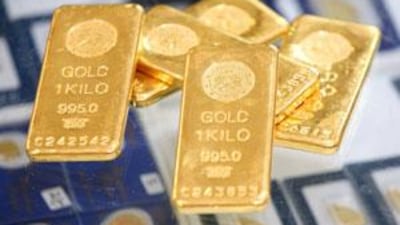DUBAI // Fewer people are buying jewellery because of higher prices and tighter shopping budgets, leading to a sharp drop in demand for gold across the region. Demand for the precious metal in the Middle East fell by 32 per cent in the fourth quarter because of its soaring cost, but a drop in the number of tourists and expatriate workers in the region to buy it is also blamed.
Jewellery demand, which drives much of the gold buying in the region, fell by 29 per cent in the final quarter of last year compared with the same period in 2008, data released yesterday by the World Gold Council showed. Gold investment purchases, such as bars and coins, dropped 57 per cent in the region. In the UAE, gold demand fell by 33 per cent in the fourth quarter of last year compared with the same period the year before. But this was an improvement from the 39 per cent drop in the third quarter of last year.
Anan Fakhreddin, the council's managing director for the Middle East and Turkey, said a major factor was the drop in tourist numbers across the region. "The biggest countries within the region in terms of [gold] consumption are Turkey, Saudi Arabia and Egypt," Mr Fakhreddin said. "They all depend on tourism." For last year, global gold demand dropped 11 per cent to 3,385.8 tonnes. For the fourth quarter, global demand worldwide fell 24 per cent to 688.3 tonnes.
But in dollar value, global sales surpassed US$100 billion (Dh367.3bn) for the second year in a row. Globally, jewellery demand was down by 8 per cent in the final quarter of last year, with the UAE and Egypt the hardest hit in the region, down 32 per cent and 35 per cent respectively. Jewellery sales in the UAE, and Dubai in particular, continue to slump because of fewer expatriates, especially Indian workers, the economic downturn and troubles in the property sector, the council said. The gold price last year peaked at more than $1,200, and had an annual average of $975.35 an ounce. This was up 12 per cent from the average price of $871.96 in 2008. Spot gold was trading at $1,121.40 yesterday.
"Consumers are holding back," said Chetan Karani, the deputy managing director of the Dubai Gold and Jewellery Group. "They are not spending as much. Yes, the gold prices went up, which gave most of them more of an excuse not to spend. The consumer psyche is not conducive to spending, especially on - items like jewellery." Dan Smith, a metals analyst with Standard Chartered Bank in London, said the firm expected the prices to "run out of steam" at about $1,145 an ounce this year.
"Gold demand will hold up quite well as the global recovery takes place both worldwide and within the Middle East," Mr Smith said. "As the economy starts to turn around, that will actually be quite good for gold in the sense that people will be looking for something to invest in. And gold will do quite well on the back of that." Demand for the precious metal will grow as prices stabilise and the global economy starts to recover, Mr Smith added.
Mr Fakhreddin expects regional demand to rebound as well: "The Middle-Eastern market is very elastic to price. Normally it takes more time to adjust to new prices. So we're confident that once consumers adjust themselves to the $1,000-plus prices, we'll see the market coming back." But Mr Karani was less optimistic for this year. "I see more of the same," he said. "Especially if we get nasty shocks like we did with Nakheel and Dubai World, consumer sentiment is going to get even worse and confidence in the local economy will be more affected."
aligaya@thenational.ae

